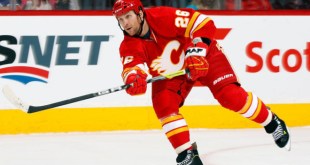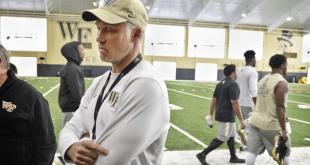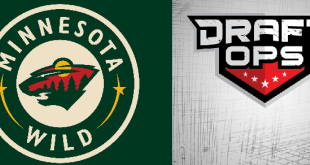Yesterday, independent arbitrator James Oldham reversed Commissioner Gary Bettman’s decision to uphold Dennis Wideman’s twenty-game suspension. Bettman’s original decision was a decent attempt at an unyielding stance against any contact with referees, but the commissioner could have reasonably foreseen that any appeal would scrutinize the player’s intent to injure. Wideman’s suspension was reduced to ten games, but only after he had already served 19 games of suspension. While any reversal of the league’s disciplinary decision is nominally a win for the NHLPA (and the player in question), in this case, the NHL could have come out much worse.
Dennis Wideman’s suspension for making contact (what looked like a vicious check in real time) with linesman Donald Henderson drew the immediate ire of the league, despite coming immediately after receiving a crushing hit himself. As Wideman did not immediately seek medical attention for a concussion, and because of his seeming composure returning to the bench, Bettman argued that Wideman was well within his faculties, and hit Henderson with intent to injure.[i] Intent to injure was a significant argument in the arbitrator’s ruling in favor of Wideman.
Oldham does not question the league’s ability to penalize physical contact with referees per Rule 40, but disagrees that Bettman’s standard of review was met with clear and convincing evidence. The arbitrator’s decision significantly hinges on Rule 40’s wording of “deliberate” contact with requisite intent.[ii] Oldham cites Stephen Walkom, the NHL’s Director of Officiating, in his observation that Wideman likely did not intend to hit or hurt Henderson, as well as Bettman’s concession that a lesser suspension was possible. In addition, the arbitrator made note of Dennis Wideman’s long career without incident to date. Overall, Oldham decided that the lesser ten-game penalty under Rule 40.3 sufficiently covered the incident between Wideman and Henderson.[iii]
Why This Decision Works for the NHL
Despite the suspension being reduced from 20 to 10 games, Wideman still ended up serving a 19-game suspension while awaiting the final disposition of his case. His financial penalty dropped from $564,516 to $282,258. This “precedent” set by Oldham will not necessarily help players or the NHLPA in future cases. This case came down to the arbitrator’s view of Wideman’s intent, which will always be a situation unique to each case. The arbitrator did not overrule the commissioner’s interpretation of the rule, only his view of Wideman’s specific facts. In essence, this “win” by the player and NHLPA ended up saving the player some money and one game.
This case will not help future players in a similar situation because deliberation and intent will always be distinct for any incident in question. The league’s initial suspension was all but served, and Wideman has no recourse to get those nine games back. The arbitration decision was just as much a judgment call as the initial suspension. While this case identifies issues with the timeliness of a full appeal process, it almost serves as a preventative measure, as a player that “wins” an appeal may still not be fully compensated for losses suffered (financial or otherwise). The NHL gets to stand by their hardline stance on referee contact in future actions, and best yet, the concussion issue was negligible in Oldham’s decision. I doubt conduct going head-to-head against concussions is something the NHL is excited to tackle.
One important takeaway would be the due process issues that players face. This incident occurred on January 27, and took just under a month and a half to complete. The arbitrator’s decision to reduce the suspension came too late to help the player, so nine games were missed for nothing. Similar to NFL suspensions for violations of the substance abuse policy, the NHLPA could (and should) attempt to push for a final disposition to a case before a player serves a suspension, so as to avoid needlessly missed games in any future cases.
Even though James Oldham ruled against the NHL, this decision could have been much less favorable in the NHL’s eyes. The decision could have slammed the NHL’s handling of a concussion situation, which would reflect terribly considering ongoing litigation on the same subject. Oldham did not deny the NHL’s ability to handle such a situation, just the specific circumstances in this one instance. Precedent may have been set to question deliberation and intent to injure, but again these factors will vary from case to case. The NHL can strenuously disagree with the decision, but in reality the league and Bettman should have known this would have come down to a judgment call in the first . The league still comes out on top, having essentially imposed the entire initial suspension, and having a decision reversed that would be hard to apply to future cases due to limited scope.
[i] NHL Rule 40.2 defines intent to injure as any physical force which a player knew or should have known could reasonably be expected to cause injury. http://www.nhl.com/nhl/en/v3/ext/rules/2015-2016-Interactive-rulebook.pdf
[ii] If you missed our discussion of the initial suspension, you can find a thorough explanation here, hitting the issues of deliberation and intent as they apply to Rule 40.
[iii] Rule 40.3: “Any player who deliberately applies physical force to an official in any manner (excluding actions as set out in Category I), which physical force is applied without intent to injure, or who spits on an official, shall be automatically suspended for not less than ten (10) games.”
 The Sports Esquires Putting Sports on Trial
The Sports Esquires Putting Sports on Trial





One comment
Pingback: Sports Law Links - The Sports Esquires